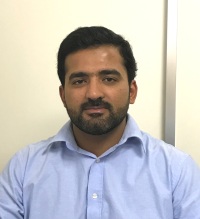“High quality surgical instruments from one of the two main producing cities in the world” --Interview with a director of a company manufacturing medical instruments in Pakistan—
2018/1/19(Fri)10:00
(Pakistan/パキスタン)
Wrangler Instruments Pvt. Ltd.
Mr. Muhammad Usman (Director/ Product Manager)
Pakistan
Many business people from abroad including the emerging countries have participated in AOTS training programs. Positions of the targeted participants vary with the programs including the ones for top executives.
We conducted an interview with a director of a company manufacturing medical instruments in Pakistan.

Huge market with few competitors
Equal respect and consideration
Linking with academia, training, and upgrading
-How do you address challenges inevitable to a developing country?
Firstly, as a developing country, competing in the medical device business market such as in the EU or US, Human Resources (HR) management is not well informed, trained or experienced as they are in developed countries.
Pakistanis are generally very hard working people. Most people work with good intent and learn new techniques and procedures very efficiently. However, compared to developed countries, the working environment as a developing country is still behind; for example, we do not have many women in work places. Some workers do not have enough education which is required for particular jobs. Generally, companies in my country are engaged in bad competitions and end up lowering their product prices to compete in the market.
Human resources are one of the main issues if one wants to be successful in developing countries. We have a dedicated HR manager in our company, who is fostering new talent for our company and also working on existing employees to engage them in different training programs and sessions. For example, we recently have acquired three laser stamping machines and trained existing employees who had been doing chemical etching to work on these machines. They are working very efficiently on these machines. Such encouragement is offered whenever available to develop human resources for our company.
We have been addressing the challenges related to HR by looking for better HR availability by linking with academia, and training employees through different courses and sessions. Recently, we have conducted an intern program with some different universities. We, however, still believe that we need better professional guidance either in the form of a joint venture or technology transfer.
Secondly, in Pakistan, the standards are quite old which is why I joined the PQM program in AOTS to learn about quality management, and how to improve daily management and policy management. From the program, I have recognized so far that the standardization of industries in my country is very slow. We need to upgrade our industrialization including systems and standard operating procedures (SOPs). This is currently the biggest challenge.
Manufacturing technology, machines and all the materials in Japan, even in the small companies, are much more sophisticated than ones in Pakistan, so it would be a great opportunity if we could obtain the technological knowledge from countries such as Japan.
Japan is our next target.
We currently have very good relationship with companies in the Benelux region. We are very closely working with our suppliers for new opportunities in the market. Recently, a kit we developed has been supplied to USAID under their program “PEPFAR” in Africa.
We are also directly supplying the headquarters of UNICEF in Denmark with our sterilizing drums under a three-year contract.
Since we would like to extend our business into other markets besides Europe, the US and Japan are definitely our next target. Recently, a Japanese hospital in Tokyo had an interest in our products and contacted us to start up a new distribution company, so we have just shipped our sample to them.
![The Association for Overseas Technical Cooperation and Sustainable Partnerships [AOTS]](/application/files/7615/7242/3141/logo-en.png)